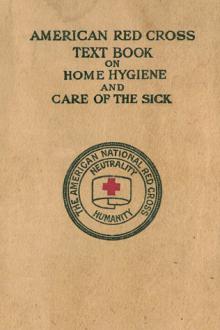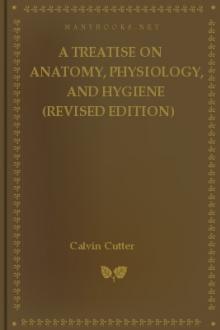American Red Cross Text-Book on Home Hygiene and Care of the Sick by Isabel McIsaac (best affordable ebook reader txt) 📕

- Author: Isabel McIsaac
- Performer: -
Book online «American Red Cross Text-Book on Home Hygiene and Care of the Sick by Isabel McIsaac (best affordable ebook reader txt) 📕». Author Isabel McIsaac
The Project Gutenberg EBook of American Red Cross Text-Book on Home
Hygiene and Care of the Sick, by Jane A. Delano and Anne Hervey Strong and American Red Cross
This eBook is for the use of anyone anywhere at no cost and with
almost no restrictions whatsoever. You may copy it, give it away or
re-use it under the terms of the Project Gutenberg License included
with this eBook or online at www.gutenberg.net
Title: American Red Cross Text-Book on Home Hygiene and Care of the Sick
Author: Jane A. Delano
Anne Hervey Strong
American Red Cross
Release Date: May 4, 2010 [EBook #32250]
Language: English
*** START OF THIS PROJECT GUTENBERG EBOOK AMERICAN RED CROSS TEXT-BOOK ***
Produced by Heiko Evermann, Fox in the Stars, S.D., and
the Online Distributed Proofreading Team at
http://www.pgdp.net
ON
HOME CARE OF THE SICK
DELANO
TEXT-BOOK
ON
HOME HYGIENE
AND
CARE OF THE SICK
BY
JANE A. DELANO, R. N.
Chairman of the National Committee, Red Cross Nursing Service; Director,
Department of Nursing, American Red Cross; Late Superintendent
of the Nurse Corps, U. S. A.; of the Training Schools
for Nurses, Bellevue Hospital, New York City; and of the
Training School for Nurses, Hospital of the University
of Pennsylvania, Philadelphia
REVISED AND REWRITTEN
BY
ANNE HERVEY STRONG, R. N.
Professor of Public Health Nursing, Simmons College, Boston
This is the Second Edition of the American Red Cross
Text-book in Elementary Hygiene and Home Care of
the Sick by Jane A. Delano and Isabel McIsaac.
PREPARED FOR AND ENDORSED BY
THE AMERICAN RED CROSS
PHILADELPHIA
P. BLAKISTON'S SON & CO.
1012 WALNUT STREET
Copyright, 1918, by American Red Cross
THE MAPLE PRESS YORK PA
PREFACETo the woman who wishes to protect her family from preventable diseases and is anxious to fit herself in the absence of a trained nurse to give intelligent care to those who are sick, this revision of the Red Cross text-book on Elementary Hygiene and Home Care of the Sick is particularly directed. It should appeal to men and to women who are interested in maintaining the health of their neighborhoods and communities and in affording effective coöperation to the public health authorities. To teachers wishing to impart protective health information to high school pupils, the book also should be useful as a class text as well as a guide.
The war, which has caused the withdrawal from private practice of thousands of physicians and graduate nurses, makes it peculiarly important to the nation for every adult to have sound knowledge as to how to prevent contagion and epidemics, especially by precautionary attention to home and local sanitation. With nurses becoming more difficult to secure, the safety of the family demands that some member in each household know enough about elementary nursing to make a patient comfortable and to carry out accurately the instructions of the physician.
The work of revision, based upon the latest knowledge of hygiene, sanitation and methods of home-nursing has been done by Miss Anne Hervey Strong, Professor of Public Health Nursing, Simmons College, under the personal direction of the author and the National Committee on Red Cross Nursing Service. The material has been painstakingly read by Dr. H. W. Rucker and Dr. Taliaferro Clarke of the United States Public Health Service, and Lieutenant Colonel Clarence H. Connor, Medical Corps, United States Army. Indebtedness to Dr. H. M. McCracken, President of Vassar College and Director of the Red Cross Junior Membership, for his valuable suggestion as to adapting the book for high school use as well as for the assistance rendered by his Department, also is gladly acknowledged.
J. A. D.
I wish to express my gratitude to those who have so kindly helped in the work of preparing the present edition. Thanks are especially due to Professor Isabel Stewart, Miss Anna C. Jamme, Professor Curtis M. Hilliard, Professor Maurice Bigelow, Miss Katharine Lord, Miss Josephine Goldmark, and Miss Evelyn Walker.
A. H. S.
CONTENTSCommunicable diseases, 1. Micro-organisms and bacteria, 1. Parasites, 3. Structure and development of parasites, 4. Bacteria, 4. Shape, 4. Size, 5. Motion, 5. Multiplication, 5. Spores, 7. Distribution, 8. Protozoa, 8. Visible parasites, 8. Transmission of pathogenic organisms, 9. Defenses of the body, 12. Immunity, 13. Vaccination and inoculation, 15. Carriers, 17. Non-communicable diseases, 20. Physical examinations, 22.
1 CHAPTER II Health and the HomeHeredity, 27. Hygiene of environment and person, 28. Ventilation, 29. Lighting, 32. Cleanliness of houses, 33. Garbage, 37. Insects, 38. Sewage, 39. Personal cleanliness, 41. Oral hygiene, 44. Treatment of teeth, 46. Clothing, 47. Food, 48. Elimination, 52. Rest and fatigue, 53. Sleep, 55. Recreation, 55.
27 CHAPTER III Babies and Their CareGrowth and development, 64. Average size, 64. Muscular development, 65. Development of special senses, of speech, of teeth, 66. Normal excretions, 67. Clothing, 68. Sleep, 70. Fresh air, 72. Diet, 72. Intervals of feeding, 73. Water, 75. Weaning, 75. Nursing bottles and nipples, 75. Tables of diet, 78. Bathing, 78. Eyes, 80. Mouth, 81. Nostrils, 81. Genital organs, 81. Development of habits, 82. Exercise, 83. Play and toys, 85.
60 CHAPTER IV Indications of SicknessObjective symptoms, 92. Temperature, 92. Pulse, 96. Respiration, 99. General appearance, 100. Special senses, 101. Voice, tongue, throat, gums, 102. Cough, 103. Appetite, 103. Excretions, 103. Loss of weight, 104. Sleep, 104. Mental conditions, 104. Subjective symptoms, 105. Pain, 105. Records, 107. Tuberculosis, cancer and mental illness, 107. Tuberculosis, 109. Cancer, 111. Mental illness, 112.
88 CHAPTER V Equipment and Care of the Sick RoomChoice of a sick room, 118. Furnishing, 120. Ventilation, 123. Heating, 124. Lighting, 124. Cleaning, 126. The attendant, 127.
117 CHAPTER VI Beds and BedmakingBedsteads, 133. Mattresses, 135. Care of the mattress, 136. Pillows, 136. Protection of the mattress and pillows, 137. Rubber sheets and pillow-cases, 138. Sheets, 139. Draw sheets, 139. Pillow covers, 140. Blankets, 140. Comforters and quilts, 141. Counterpanes, 141. Bedmaking, 141. To make an unoccupied bed, 143. To change a patient's pillows, 146. Lifting a patient in bed, 146. To turn a patient in bed, 147. To change sheets while patient is in bed, 147. To move patient from one bed to another, 150.
132 CHAPTER VII Baths and BathingCleansing baths, 154. Bed bath, 156. Care of the mouth and teeth, 160. Care of the hair, 163. To wash the hair of a bed patient, 164. Hot foot-baths, 165. Cool sponge bath, 166.
154 CHAPTER VIII Appliances and Methods for the Sick-RoomDevices to give support, 172. Bedpans, 176. Daily routine in the sick-room, 179. Time for visitors, 182.
169 CHAPTER IX Feeding the SickThe digestive process, 188. Feeding the sick, 191. Liquid diet, 192. Semi-solid diet, 192. Light or convalescent diet, 193. Full diet, 193. Serving food for the sick, 195. To feed a helpless patient, 197.
187 CHAPTER X Medicines and Other RemediesAction of drugs, 200. Amateur dosing, 202. Patent remedies, 205. Administration of medicine, 206. Suppositories, 209. Enemata, 210. Sprays and gargles, 213. Inhalation, 213. Inunction, 214. Household medicine cupboard, 215.
200 CHAPTER XI Application of Heat, Cold and Counter-IrritantsInflammation, 220. Hot applications, 225. Dry heat, 225. Moist heat, 227. Stupes or hot fomentations, 229. Cold applications, 231. Dry cold, 231. Moist cold, 232. Cold compresses for the eyes, 232. Counter-irritants, 233. Mustard paste, 233. Mustard leaves, 234.
220 CHAPTER XII Care of Patients with Communicable DiseasesIncubation period, 238. Care of patients with colds or other slight infections, 238. Care during more serious infections, 242. Children's diseases, 246. Rules for isolation and exclusion from school, 247. Disinfection, 248. Care of nose and throat discharges, 249. Care of discharges from the bowels and bladder, 249. Bath water, 250. Care of the hands, 250. Care of utensils, 251. Care of linen, 251. Disinfection of the person, 252. Termination of quarantine, 252. Terminal disinfection, 253. Fumigation, 254.
236 CHAPTER XIII Common Ailments and EmergenciesConditions in which the nervous system is involved, 257. Headache, 257. Sleeplessness, 258. Fainting, 259. Convulsions, 260. Shock, 261. Stimulants, 263. Sunstroke and heat exhaustion, 264. Conditions in which the digestive tract is affected, 265. Nausea and vomiting, 265. Hiccough, 265. Diarrhœa, 266. Constipation, 266.





Comments (0)